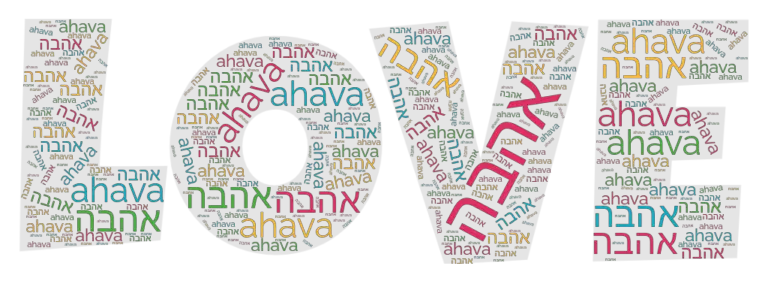You’re setting out on a fascinating trip and learning a new language. One of the must-have phrases in your travel bag is knowing how to say “thank you.” Hebrew has a long history and a rich variety of ways to express gratitude. You can use this post as a map to show you common ways to say thank you in modern and even Biblical Hebrew, including when and where to use them. And as a special bonus, we’ll also discover how to say “You’re welcome!”
The first phrase to pack is “toda” (תודה). Saying “toda” is easy. The first part sounds like “toe,” as in the ones on your foot, and the second part sounds like “dah,” just like a magician might say after a trick—Tadah! So all together, it’s “toe-dah.”
You can use “toda” pretty much anywhere, from casual meetups to formal events.
But that’s not all. Hebrew has even more ways to show thanks that you’ll want to learn. Each phrase has its own special use, so understanding when and where to use it makes your Hebrew sound more natural. As we go through this post, we’ll dive deeper into these phrases and their appropriate uses.
And don’t worry if you have questions, a chatbot is waiting at the end of the post to help clear things up.
So, ready to learn more? Let’s go!
Thank You in Hebrew: The Basics
“Toda” can be used in almost any situation to express gratitude in both formal and informal conversations alike. Whether you’re thanking your bus driver, appreciating a warm meal at a friend’s house, or acknowledging a coworker’s assistance, “Toda” is your go-to expression.
Furthermore, its simplicity does not limit its flexibility. The pronunciation of “Toda” remains the same regardless of the speaker’s or listener’s gender, making it a user-friendly phrase for Hebrew learners.
This is a plus because Hebrew is a gendered language, meaning that a simple sentence has many variations depending on who the speaker and listener are. For example, in order to say “I love you” in Hebrew, the sentence would change if you were male or female, as well as if the listener were male or female or a group of males or females, resulting in six different versions! You can learn more about saying “I love you” in Hebrew in this post. But no such worries with “Toda”!
In the following sections, we’ll delve into the many dimensions of saying “thank you” in Hebrew, exploring variations, context-specific expressions, and even the perfect responses to “Toda.” And “Toda” isn’t limited to the modern streets of Tel Aviv or the quaint neighborhoods of Jerusalem. This word can even trace its roots back to Biblical Hebrew, which we’ll cover too.
For now, let’s look at how “Toda” is used and how to say it.

Mixing Up Your Hebrew Thank Yous
Everyone understands the importance of saying thank you, and every language has its own unique ways to express it. Just like any other language, Hebrew also has a variety of phrases, each one slightly different, and all fitting for different situations. So, in this post, we’re going to dive in and explore these unique ways of saying “thank you” in Hebrew.
Variations of “Thank you”
תודה (Toda)Pronounced: Toh-dahYour go-to word for “thank you” in Hebrew, great for any situation. |
תודה רבה (Toda Raba)Pronounced: Toh-dah rah-bahA step up from Toda, it means “thank you very much,” and is used when you want to stress your thanks. |
רוב תודות (Rov Todot)Pronounced: Rov toh-doteMeaning “many thanks,” this phrase is often found in written messages. |
אסיר תודה (Asir Toda)Pronounced: Ah-seer toh-dahThis means you’re deeply grateful, used when you’re saying thanks for a big favor. |
חן חן (Chen Chen)Pronounced: Khen khenKhen is a type of beauty, but when you say it like this “Khen khen,” it means “thank you very much!” It’s not used as much these days, but you can still hear it now and then. |
הכרת טובה (Hakarat Tova)Pronounced: Hah-kah-raht toh-vahThis literally means “recognizing good,” and is used when you’re acknowledging someone’s kindness or a good deed. |
המון תודה (Hamon Toda)Pronounced: Hah-mon toh-dahMeaning “a ton of thanks,” it shows you’re really thankful. |

אני מעריך את זה (Ani Ma’arich Et Ze)Pronounced: Ah-nee mah-a-reach et zehThis means “I appreciate it,” and is often used in more formal situations. |
אלפי תודות (Alfei Todot)Pronounced: Al-fei toh-doteTranslating to “thousands of thanks,” it’s like saying “thanks a thousand times.” |
בתודה (BaToda)Pronounced: Bah-toh-dahMeaning “with thanks.” |
תודה מראש (Toda Me’rosh)Pronounced: Toh-dah meh-roshThis translates to “thanks in advance,” and is used when you’re thanking someone ahead of time. |
תודה מקרב הלב (Toda Me’kerev Halev)Pronounced: Toh-dah meh-keh-rev hah-levMeaning “thanks from the bottom of my heart,” it shows your thanks are really heartfelt. |
תודה על הכל (Toda al ha’kol)Pronounced: Toh-dah al hah-kolTranslation: Thank you for everything. |
Now that we’ve gone through a list of different expressions to say ‘thank you’ in Hebrew, let’s see a couple of them in action. These examples will give you a taste of how these phrases can be used in everyday situations.
Context Specific Examples
| If you’ve received help: תודה על כל העזרה (Toda al kol he’ezrah) Thank you for all the help. |
| For a gift: תודה על המתנה (Toda al ha’matana) Thank you for the gift. You can often add ואני מאוד מעריך\ה (ve’ani me’od me’arich\a) to say, “and I really appreciate it.” |
| When you’ve received kind words or compliments: תודה על המילים החמות (Toda al ha’milim ha’hamot) Thank you for the kind words. |
| To ask someone how they are after thanking them, you can say: תודה רבה! איך אתה? (Toda rabah! Eich ata?) Thank you very much! How are you? |
| If you want to stress your thanks for specific help, you can use: אני מודה לך על העזרה (Ani mode lecha al ha’ezra) I’m grateful to you for the help. |
| If you’re at a dinner party at a friend’s house or any other event where you’ve been hosted, you might want to show your thanks by saying: תודה רבה על האירוח הנפלא (Toda rabah al ha’iruach hanifla) Thank you very much for the wonderful hospitality. |

These context-specific examples can indeed come in handy for your day-to-day interactions. Therefore, mastering them will allow you to pick the perfect phrase that best fits the occasion.
Expressions of Gratitude With Religious Undertones
As a language deeply woven into Jewish religion and culture, Hebrew has expressions of thanks that are imbued with strong religious connotations. While their roots lie in religious traditions, these phrases are also commonly used by secular speakers and are widespread in contemporary Israel.
|
Baruch Hashem (ברוך השם) Pronunciation: Bah-rook hah-shem Translating to “Blessed is the Name,” this phrase parallels the English expression “Thank God.” It signifies gratitude, relief, or joy, associating these feelings with divine providence. |
|
תודה לאל (Toda La’el) Pronunciation: Toh-dah la-el Meaning “Thanks to God,” this expression is utilized when acknowledging blessings or good fortune. |
|
Shehecheyanu (שהחיינו) Pronunciation: Sheh-heh-kheh-yah-noo A unique blessing, Shehecheyanu, is uttered in gratitude for novel or extraordinary experiences. It is usually recited during holidays or when doing something for the first time in a long time. While not directly translating to “thank you,” it embodies profound gratitude for reaching a particular moment. |
As evidenced above, the Hebrew language presents a multitude of ways to say thanks, each imparting its unique depth and texture to the expression. Learning and using these phrases can deepen your connection to the Hebrew language and the culture it represents. Whether you’re expressing gratitude for a favor, a gift, or recognizing someone’s kindness, these Hebrew expressions will enable you to communicate your gratitude with authenticity and heartfelt sincerity.
Expressions of Gratitude in Popular Hebrew Songs
“Halleluya”
Indeed, our journey exploring gratitude in Hebrew wouldn’t be complete without taking a look at the rich cultural trove of Israeli music. In fact, I believe that turning to popular songs is one of the best ways to internalize any language you’re learning (you can read more about this strategy here). I’ve chosen two songs that encapsulate the spirit of thankfulness, and the first is the iconic “Hallelujah,” performed by Milk and Honey. Interestingly, this song isn’t just an artistic masterpiece; it also secured Israel’s victory in the Eurovision Song Contest back in 1979.
While the entire song is an homage to the wonders of the world, one particular line resonates deeply with our theme: ‘במילה אחת בודדה / הלב מלא בהמון תודה / והולם גם הוא – איזה עולם נפלא.’ This translates to ‘In one solitary word / the heart is filled with a lot of thanks / and it echoes too – what a wonderful world.’
Check out “Hallelujah” in the video below and spot the line where “תודה” (Toda) is mentioned. You’ll hear it first from Gali Atari, the singer, about 30 seconds into the video.”
“Modeh Ani” – Omer Adam
The “Modeh Ani” prayer has been a staple in Jewish culture for centuries. Every morning, it’s recited as a way to express gratitude for the gift of a new day. The phrase “Modeh Ani” directly translates to “I give thanks.”
Recently, this time-honored prayer found a new home in popular culture, thanks to the Israeli singer Omer Adam. His modern hit song, appropriately named “Modeh Ani,” takes this traditional prayer and infuses it with a contemporary flair. Complete with catchy beats and polished production, Adam’s take on “Modeh Ani” is more than just a song – it’s a global sensation, having accumulated over 40 million views!
Omer Adam’s rendition serves as a daily reminder to start each day with a sense of gratitude, a principle deeply rooted in Jewish tradition. His innovative blending of this old prayer with modern music has not only preserved its cultural significance but also introduced it to a whole new generation of listeners, making it relevant and appealing in today’s fast-paced world.
‘Thank You’ in Biblical Hebrew
As Hebrew is an ancient language with a rich history, it’s not surprising to find expressions of gratitude throughout the Bible. In these scriptures, ‘thank you’ is not merely a polite expression, but a profound acknowledgment of God’s benevolence and blessings. To further grasp the depth and versatility of expressing gratitude in Hebrew, let’s explore some notable biblical instances of beautifully portrayed thankfullness.
Firstly, let’s explore the biblical connotations of the Hebrew term for thank you, “תודה” (Toda). Intriguingly, it is indeed present in the Bible, although its usage diverges somewhat from its contemporary application in expressing gratitude or thanks. Originating from the root word “ידה” (Yadah), the term signifies to acknowledge, confess, or offer praise.
Psalms
Most prominently, the Book of Psalms—a biblical composition overflowing with heartfelt expressions of gratitude, worship, and pleas for divine assistance—frequently incorporates variants of this word to signify the act of extending thanks or praise to God.
For instance, Psalm 100:4 states, “Enter His gates with thanksgiving (תודה, Toda) and His courts with praise; give thanks (הודו, Hodu, from the same root) to Him and praise His name.” Here, the psalmist encourages readers to approach God with hearts abounding in gratitude.
Moving forward to Psalm 107:1, “Give thanks (הודו, Hodu, from the same root) to the LORD, for He is good; His love endures forever,” this verse illuminates the psalmist’s expression of gratitude to God for His unyielding benevolence.
Similarly, Psalm 92:1 reads, “It is good to give thanks (להודות, Lehodot, from the same root) to the LORD, And to sing praises to Your name, O Most High.” Once again, the psalmist underscores the merit of bestowing thanks upon the Lord.

The Bible
The Book of Leviticus also makes reference to “Toda.” In Leviticus 7:12-15, the scripture describes the “sacrifice of thanksgiving” (זבח התודה, Zevach Hatoda), which is a type of peace offering made to express gratitude towards God.
In its biblical context, “Toda” often encapsulates a deeper, spiritual act of giving thanks, with a focus on praising God, acknowledging His goodness, or offering sacrifices. Notably, it underscores a fundamental principle of Jewish faith and spiritual life—expressing gratitude to God, recognizing His ceaseless goodness, and love.
Finally, tracking the transition from the ancient usage of ‘Toda’ in the scriptures to its modern-day conversational application provides fascinating insights into not just the evolution of language, but also the enduring significance of gratitude within Hebrew culture.
Responding to Gratitude: Saying “You’re Welcome” in Hebrew
Expressing gratitude is indeed an essential part of any conversation. Equally important, however, is knowing how to respond when someone offers their thanks. Let’s explore the various ways to say “You’re welcome” in Hebrew, each with their own nuances and best used in specific contexts.
- בבקשה (Bevakasha): While its literal translation is “please,” Bevakasha is the most widely used equivalent of “You’re welcome” in Hebrew. It’s a versatile phrase appropriate for both casual and formal interactions. Thus, whether you’re in a professional meeting or chatting casually with a friend, feel free to use “Bevakasha” in response to “Toda.”
- בשמחה (Besimcha): This expression literally means “with joy” or “with happiness.” You would employ Besimcha to signal that it was a pleasure to help or to do something. It communicates that you were delighted to lend a hand, making it a warm and friendly response to a thank you.
- על לא דבר (Al Lo Davar): This translates directly to “it’s not a thing,” similar to the English “don’t mention it.” While not as prevalent in contemporary spoken Hebrew, you may still hear it used in specific contexts or among older generations.
- עם כל הלב (Im Kol Halev): This phrase translates to “with all the heart,” signifying that you gave your help wholeheartedly. It’s a very warm and sincere response, best used when you share a close relationship with the person.
Less Formal
- אין בעיה (Ein Beaya): The Hebrew equivalent of “No problem,” Ein Beaya is an informal phrase often employed among friends, coworkers, or in relaxed environments. If someone thanks you for a favor or help, you can reply with “Ein Beaya,” indicating that it wasn’t a bother at all.
- בכיף (Bekef): Another casual way to say “You’re welcome.” The Hebrew word “כיף” (kef) means fun, so when you say “Bekef,” you’re essentially stating, “It was fun,” implying you enjoyed the task and did not find it burdensome. This phrase is typically used among friends.
- באהבה (Be’ahava): Translating to “with love,” Be’ahava is used to demonstrate that the favor you performed came from your heart or out of love. It’s a deeply heartfelt response, signaling a strong connection with the individual you’re speaking to.
Each of these responses can be used to answer “Toda,” the choice of which depends on the context and the nature of your relationship with the other party. Just as expressing gratitude is crucial in social interactions, knowing how to respond is equally important, and using the appropriate phrase can deepen your bond with others.
Knowing how to accurately respond to gratitude in Hebrew is as vital as expressing it. It sets the tone for a respectful, warm, and friendly connection, reinforcing the relationship between individuals. By understanding these phrases and their contexts, you’ll be well-prepared to respond when someone thanks you in Hebrew.
The following table summarizes “You’re welcome”:
| בבקשה (Bevakasha) Please Most common way to say “You’re welcome,” suitable for both formal and informal settings. |
| בשמחה (Besimcha) With joy Used to express that it was a pleasure to help or do something. |
| אין בעיה (Ein Beaya) No problem Informal phrase often used among friends, colleagues, or in casual environments. |
| בכיף (Bekef) It was fun Casual expression used to imply enjoyment in doing a favor, typically used among friends. |
| באהבה (Be’ahava) With love Used to express that the help or favor was done out of love or from the heart. |
| תמיד בשירותך (Tamid Beshirutcha) Always at your service Formal phrase expressing dedication and readiness to assist, often used in professional or customer service contexts. |
| על לא דבר (Al Lo Davar) It’s not a thing Old-fashioned phrase equivalent to “don’t mention it,” less common in modern spoken Hebrew. |
| עם כל הלב (Im Kol Halev) With all the heart Used to signify that a favor or help was given wholeheartedly, often used when a close relationship exists with the person. |
Frequently Asked Questions
Q1. Is there a gender variation for saying ‘thank you’ in Hebrew?
Great question! Hebrew certainly can be confusing when it comes to gender variation, but not here. The lovely thing about “Toda” is that it’s gender neutral. It doesn’t matter who you are or who you’re talking to, “Toda” fits every situation. It’s like the Swiss Army knife of thank yous!
Q2. Are there deeper meanings hidden in these expressions of gratitude?
Definitely, Hebrew is a rich and meaningful language. A simple “Toda” can take you a long way, but expressions like “Baruch Hashem” take you a step deeper. It’s like adding a layer of spirituality to your ‘thank you’. A simple two-word phrase can suddenly reflect your connection to a higher power.
Q3. Why should I take the time to learn when to use which ‘thank you’?
Think of it as a linguistic adventure. You can get by with a basic “Toda,” but knowing the right phrase for the right situation gives you an edge. It’s like picking the perfect accessory to complete your outfit. It shows you appreciate the nuances of the Hebrew language and culture.
Q4. Is there a certain prestige associated with the different ways to say ‘thank you’?
Not so much prestige, but more like layers of understanding. “Toda” is your base layer – it’s simple and always appropriate. But as you add layers like “Toda Raba” or “Ani Ma’arich Et Ze”, you’re demonstrating a deeper understanding and respect for the language. It’s less about prestige and more about depth of understanding.
Q5. Why do religious expressions find their way into the way we say ‘thank you’?
In Hebrew, language and faith are interwoven. Phrases like “Baruch Hashem” are acknowledgments of a higher power and reflect a certain way of life and thinking. It’s not just a language, it’s a window into a rich and vibrant culture.
Q6. Has the way gratitude is expressed in Hebrew evolved over time?
Absolutely! Like any language, Hebrew has evolved and changed over the centuries. Biblical Hebrew had its own expressions of gratitude, while Modern Hebrew has a range from the everyday “Toda” to the more religious “Baruch Hashem.” It’s like the fashion trends of language – the styles change, but the essence remains the same.
ChatBot
Please use our chatbot if you have more questions or need further clarification on any point. We are here to assist you in your journey of learning and expressing thanks in Hebrew!
Toda for Visiting WordTap!
Mastering the art of expressing gratitude in Hebrew is not only an important aspect of language learning, but it’s also a powerful way to understand and connect with the rich culture and tradition of Israel. Whether it’s a simple “Toda” or the deeper expressions of gratitude in prayers, songs, and Biblical texts, each phrase provides a unique insight into the Hebrew way of expressing appreciation.
Similarly, learning to respond to gratitude appropriately helps in fostering positive relationships and mutual respect. Remember, every phrase you learn and use brings you closer to the heart of the Hebrew language and its people.
I hope your journey into the Hebrew language is filled with many moments of joy and discovery. If you’d like to expand your knowledge on learning Hebrew, we’ve compiled 19 ways for you to explore. Keep practising, stay curious, and remember that we are here to help you along the way.
תודה רבה (Toda Raba) for reading this post, and don’t hesitate to reach out if you have any questions. Happy learning!




